Congressman Kai Kahele Hits the Ground Running
Alfredo G. Evangelista | Assistant Editor
Editor’s Note: Back from Washington D.C., new U.S. Representative Kaiali‘i Kahele sat down briefly for an exclusive interview with the Fil-Am Voice. While visiting the Binhi at Ani Filipino Community Center, the Big Island lawmaker touched on his first days in office, his family and his ties to the Philippines, the American Rescue Plan, the future of tourism, Hawai‘i’s food production and his role as a Congressman for the neighbor islands and rural O‘ahu.
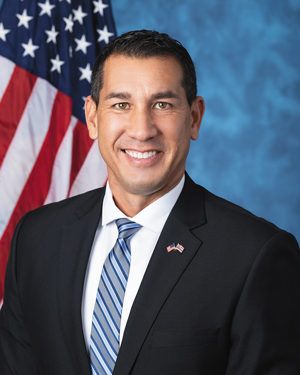
Official House.gov Image
“It’s been a whirlwind. Nothing like I would have ever imagined,” says Congressman Kaiali‘i Kahele in describing his first three months. He and his family departed for Washington, D.C. in late December. “We were up there for New Year’s. I got sworn in on the third. Insurrection was on the sixth. We impeach President Trump like a week later. Biden was sworn in as President on the 20th. And then we worked on the American Rescue Plan.”
Kahele has been to the Philippines on many occasions, flying as a military pilot to Subic and Clark Economic Zone in Pampanga. “I’ve also flown to Mindanao where the Abu Sayyaf is and I’ve been down there for classified missions,” he recounts. “I’ve also been to Palawan and participated in Operation Balikatan and delivered books for school children in Palawan. And I’ve also worn my Hawaiian Airlines uniform and flown into Manila when Hawaiian Airlines was flying to Manila.”
But Kahele also has more personal links. “I have a lot of connections and ties to the Philippines of course through my wife Maria who is a Filipina and we have two daughters who are Filipina as well,” Kahele says proudly. “My wife Maria Gorospe was born in Baguio. My mother-in-law Eleanor Gorospe comes from northern Philippines in the Ilocano area—the province of Cagayan. When Maria was born in Baguio, they lived there for about two years and then moved to the coast—La Union. She still has her Philippine birth certificate today; she has dual citizenship.” Maria is one of nine children of John Day and Eleanor Gorospe Day. Maria and her older brother were born in the Philippines and the rest of the family were born in different places. “My father-in-law and mother-in-law own property in Samar. They still go back quite often. The Gorospe family still lives in the Philippines.” Maria’s parents now live in Hilo where Eleanor is an APRN at Hilo Medical Center.

Photo courtesy Kahele ‘Ohana

Photo courtesy Kahele ‘Ohana
Elected in November, the Kaheles initially planned to move to D.C. but the January 6th insurrection changed all that. On the day of the Capitol sacking, they were in their apartment—just two blocks from the Capitol where they could hear the explosions and the tear gas. “It was crazy,” says the Congressman. “They specifically told us ‘Do not come to the Capitol, stay in your offices because of the crowded gatherings.’ So I was in my apartment with them.” The Congressman received many calls of concern and posted on Facebook they were safe but did not disclose his whereabouts for safety reasons.
Lingering rumors that some Republicans lawmakers assisted the insurrectionists, however, has not deterred Kahele’s ability to build relationships with some colleagues across the aisle. “Most of them are either former military or veterans, like me. So we have a common link there. And then others are faith-based. I go to the prayer breakfast every week. I went to the National Prayer Breakfast which was virtual, unfortunately.”
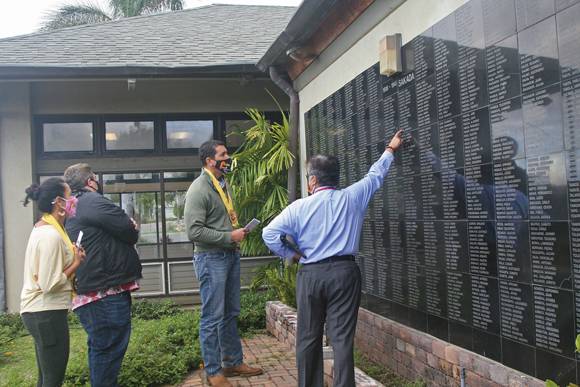
Photo: Basilia Evangelista
The Congressman hopes he brings a different vibe to the Hawai‘i delegation. “I think they [U.S. Senators Brian Schatz and Mazie Hirono and U.S. Representative Ed Case] like the new energy in our delegation.” Kahele notes for a long time the Hawai‘i delegation did not include a neighbor island resident. “But if you don’t live on a neighbor island, you don’t understand what it’s like to live on Maui. You don’t understand what it’s like to live in Hilo. I bring that perspective. I also bring something Congress has only had one since statehood—a Native Hawaiian perspective.”
Kahele also describes his “great relationship” with fellow Congressman Case, who represented the same district at one time. “He has been very instrumental in helping prepare me to become a new member of Congress. He’s gone through the orientation process twice so he’s very familiar with what a freshman experience can be like—what to expect, the fast pace, how you have to position yourself so you can get some of the things you want like committee assignments and office locations, how to set up your staff. Building your team is really important and having the right people in place is important. For me, it’s all about trying to find the right people with the right skill sets.”
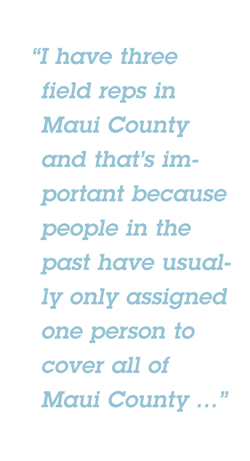
Representing a district spanning every neighbor island and the more rural parts of O‘ahu, Kahele took a different approach for staffing and his local office—members of Congress are allowed no more than eighteen full time positions and no more than four part-time positions for their D.C. and state offices. The four part-time staff are based on Kaua‘i (Michael Contrades), Lāna‘i (Joelle Aki), Molokai (Gene Ross Davis) and Maui (Stephanie Ohigashi). “I have three field reps in Maui County and that’s important because people in the past have usually only assigned one person to cover all of Maui County, who typically lives on Maui. Lāna‘i and Molokai usually didn’t have a voice.”
Kahele also moved the Second District congressional office from downtown Honolulu to Hilo. “I have a young family. They go to preschool and first grade. My wife is at home taking care of them. For me to have the district office in Hilo allows me a chance to take them to school to work from the office ten minutes away from my house.”
As a freshman Congressman, he notes the importance of the Democratic Senators and Representatives working together with President Joe Biden. “In the first sixty days, we’ve passed the American Rescue Plan—$1.9 trillion. The only reason we’re able to do that is because we have a unified Congress and a unified White House—Democrats. If not, we would not have done it right now. Think about that. President Biden took office January 20th—he signed a bill into law in the first sixty days and that bill is one of the most consequential bills passed in recent memory that is going to help our working poor or middle-class families and to help get through the pandemic.” Kahele notes the first CARES Act of $2.2 trillion was passed in March 2020 with bipartisan support and the second CARES Act of just under a trillion dollars was passed in December 2020 with bipartisan support. “The third COVID-related bill—the American Rescue Plan—not one Republican voted for that bill, not a single one.”
The Congressman animatedly spoke in depth about the four major aspects of the American Rescue Plan: vaccinations, stimulus payments, jobs preservation and education.
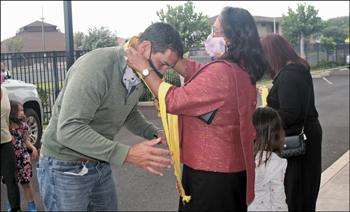
Photo: Basilia Evangelista
Kahele, who received the Pfizer two-shot vaccine, notes “Every American in this country, if they want a vaccine can have one by the end of May. As soon as we get the majority of the country inoculated, I really believe we’re gonna be looking at COVID being in our rearview mirror.” Kahele believes the effects of the pandemic will last through 2021–2022 and points to the dangerous variants. “With the variants coming, it’s even more important to get your vaccine because that variant is aggressive. But the vaccine, according to the science-based data they’ve provided, can minimize dramatically the effects of the virus, minimize the transmission with things like wearing masks, social distancing, and also limit the amount of harmful effects or the probability of getting COVID-19. The delegation is united in the message we want to provide to the people of Maui, which is ‘Get your vaccine as soon as you’re able to get it.’ ”
The American Rescue Plan will “provide direct money into the pockets of most Americans that qualify via that direct stimulus payment of $1,400,” explained Kahele. “If you make $75,000 or below and you’re a single parent, you’re going to get $1,400; if you make more than $80,00, you’re not going to get anything. From $75 to $80,000, it’s going to slowly phase out and at $80,000, it’s phased out. If you’re married, filing jointly, $155,000 is the threshold and it phases out at $160,000. If you lost your job and you’re collecting state unemployment insurance, we added $300 in federal funds to the current state unemployment insurance you would get per week.” Kahele notes the first $10,200 in unemployment insurance benefits are tax free. “That’s going to help keep money in people’s pockets.”
Kahele also noted the sea change for parents, especially single parents, with young children. “The earned income tax credit is a progressive Democratic plank—a policy provision different from Republicans. They’re not into earned income tax credits but the EITC is one of the best ways to help people come out of poverty. Increasing the amount you get back and expanding the coverage limit, which is what we did in this bill, the child tax credit is really important.” He understands raising a child is expensive, costing about $250,000 from conception to 18 years old. “We expanded the child tax credit, which was $2,000 and we made it $3,000. If your child is six years of age or less, we added $600. For every child in your family, if you qualify, if that child is less than six years old, it’s a $3,600 child tax credit on your tax return, which is now due on the 17th of May because the IRS extended the deadline yesterday.” Kahele believes the child tax credit will cut child poverty in half. After a year, Congress will need to act to make it permanent. “Why that’s important is we know if we can keep children out of poverty, of going hungry, of sleeping in their car, of being raised in a dysfunctional household because of the economic challenges that people have, we can help their long-term growth effects. We know children that grow up in poverty in those types of very difficult situations have long term health effects, long term mental health effects, long term growth effects and it’s this cycle of poverty that we can never get out of. This child tax credit is really, really important for the poor.”
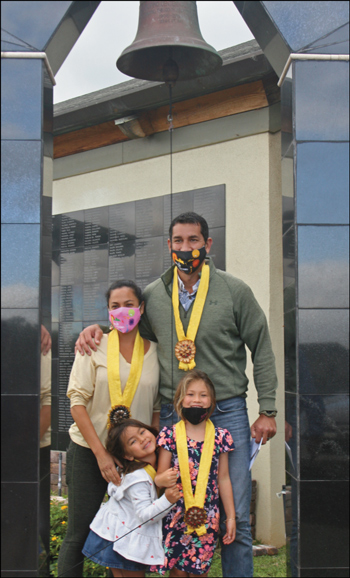
Photo: Basilia Evangelista
The American Rescue Plan also continues assistance to struggling businesses. “We extended billions of dollars to important corporations, like the airline industry, so that we can extend the Paycheck Support Program—the Paycheck Protection Program for small businesses. For example, we appropriated $14 billion to the airline industry because we cannot let the airlines fail.” Kahele observes the airlines employ thousands of people and the airlines are critical to our transportation infrastructure. “As an example, Hawaiian Airlines was going to lay off 900 employees on April 1 and they issued those notices to Hawaiian Airlines employees, many of which work right here at Kahului Airport. Because we passed the American Rescue Plan, nobody loses their jobs, everybody will keep their jobs, all the furlough notices were canceled and they keep their jobs and health care. That’s really important for a family that has to be able to take their kids and their family to the doctor when they’re sick.” Kahele also detailed the funds to the SBA. “We also put billions of dollars into the SBA programs so they can issue grants to Mom-and-Pop stores—stores that are struggling to survive, that have kept people on payroll, that have lost revenue, lost inventory and need help with their rent payments. When we keep people on the payroll, we keep them on their health insurance and that’s a good thing. Otherwise, we would be dumping them onto the state’s unemployment insurance program.”
Kahele understands the limitations of the unemployment insurance program and explained how the American Rescue Plan assists with health care. “The day you lose your job, potentially, you lose your healthcare. So what are your options?” The Congressman noted one could pay for their own health care, try to qualify for Medicaid or sign up for the Affordable Care Act (Obamacare) as the enrollment period was extended to May and additional subsidies were provided so the total amount of premiums would be about 8.5 percent of the gross annual earnings. “What is the other option for health care that you have if you lost your job? COBRA. How much is COBRA? Thousands of dollars. But not for the next six months as we just made it free. If you want COBRA, you can have COBRA until the end of September. The bottom line is there will not be a single person on Maui calling me who should have to worry about not being on health care.”
The Congressman highlighted how the American Rescue Plan would get kids back in school. “We added billions of dollars to provide to the state public educational districts and school systems—the necessary PPE, the necessary work environment, the necessary tools teachers would need, so that kids can go to school, teachers can feel comfortable teaching in that environment, and we can get kids back in school.” Kahele expressed how important it was for kids to return to school to learn in a normal environment as they “have lost a year basically of their educational and social interaction.”
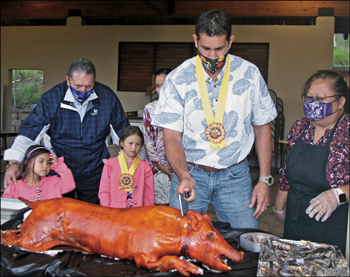
Photo: Alfredo Evangelista
Kahele’s first trip to Maui Nui as a Congressman started on Lāna‘i. “I came over here yesterday on the ferry. Well, we thought we was gonna die. Twenty-foot swells in the channel. Oh my gosh. My body is still a little whacked out. We arrived yesterday at 12 o’clock on Maui. I could have gone to the hotel and went to sleep for the rest of the day but we had stuff planned. So you got to just suck it up and roll, man. But I still don’t feel fully recovered from that boat ride,” he admitted.
“It’s been a good trip. We’re mostly focused on central Maui—Wailuku, Kahului—and focused on the flood,” said Kahele. His schedule on Maui was full—spending time with Mayor Michael Victorino, Managing Director Sandy Baz and Emergency Management head Herman Andaya. Kahele visited Ha‘ikƉ, toured the Maui Ocean Center, talked story with community members concerned about the wastewater discharge into Mā‘alaea Bay, met with ILWU president Donna Domingo together with Maui Division chief Bobby Andrion and Business Agent Manny Baltazar, and huddled with the Hawai‘i National Guard, Dr. Pang and the Department of Health at the University of Hawai‘i Maui College vaccination site. “The next trip, we’ll probably spend more time in West Maui, maybe go out towards Hāna. But you know, my goal is to come to Maui at least three if not four times a year, every year, at least while I’m in office.”
With tourism continuing to be the economic engine, Kahele says he talks frequently with Victorino. “Well, you know, with the Mayor, we talk about tourism a lot. I just came into Lahaina the other day and there’s a lot of tourism here. But it’s that balance.” Kahele understands the governor has his plans but the governor has also respected County Mayors and their ability to make decisions they feel are in the best interest of their respective Counties. “Everyone has different policies and timelines for when they think their County is ready to reopen for tourism. They’re also using data.” Kahele noted Maui’s high count of forty-one COVID cases—the highest in the State on the day of the interview. “That’s something that Mayor Victorino has to figure out why that’s the case—looking at the data, looking at the arrivals from the transpacific. Is it cases that have originated from tourists or is it cases that have originated within the community? So he can figure out what is the right timing. And then we need to look at how do we reopen the economy to tourism and also do it in a way that we keep in mind the health and safety and welfare of our residents—the people that live here—so I don’t envy being in his shoes.”
The Congressman noted the different approach taken by Kaua‘i. “We’ve also seen Mayor Kawakami take a different path than our other Mayors. And today, his COVID count was zero and his COVID count is usually zero but the economy on Kaua‘i is zero. That’s not good either but I’m not in that seat. I don’t walk in his shoes; I don’t get the same data and briefings that he gets every day. So I’m not here to be an armchair quarterback.” Kahele fully understands his job and his role. “I’m here to support the Mayor and the County of Maui, especially as it relates to the flooding last week, especially as it relates to the role that FEMA can play.” Kahele reports the County of Maui will receive $32.47 million through the American Rescue Plan. “That was different than the previous two CARES packages. This is the first time Maui County is getting direct money from the U.S. Treasury and I am going to ensure that happens and that it doesn’t go to the Budget and Finance Director on the Fifth Floor of the Capitol.” Kahele expressed the Hawai‘i delegation’s united support for the Governor’s and the County’s emergency flood proclamations. He promises the federal government’s assistance in reimbursing the County’s repair efforts and the assistance of the Army Corps of Engineers to assess the damage. “It’s a whole team effort—State, County, Federal to address some of these natural disasters.”
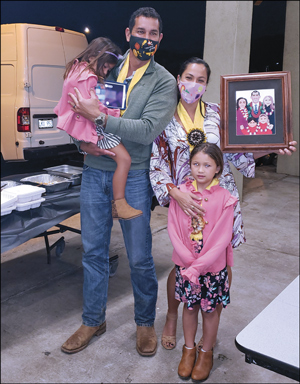
Photo: Alfredo Evangelista
Kahele and Victorino both hail from Hawai‘i island and that will serve Maui well. “Well, part of it is relationships, you know, working together with the Mayor, working together with our different state and county partners in terms of tourism.” Kahele says the airlines are an important piece of the equation and notes the airlines are under the purview of the federal government through the Federal Aviation Administration, with federal dollars supporting the airports. “Part of it is ensuring the federal government has robust national testing strategy, that we have a national or at least a well thought out contact tracing strategy.” He wants to make sure that tourists at their point of embarkation have taken the test and they’re COVID free when they travel. “And when they come into Maui, they’re not going to be bringing COVID” with them. “I think it’s really up to the Mayor and his team and the Governor as to how much they want to open up that spigot to let more people back in because I really believe people are tired of being at home, tired of being on ZOOM. They want to get out and travel, they want to come to Hawai‘i. We are a leisure destination that people love to come to. But we cannot go right back to 10 million tourists. There’s no possible way.” Kahele says we need to safely reopen that spigot and let people come back to Hawai‘i in a safe way and be mindful of the residents. “But we also know that tourism is a major lifeline for our economy. It also challenges us to think outside the box. And think about how we want to diversify the economy or what we want to plan for the future. What does Maui County look like in 2050?” Kahele asks. “What kind of Maui are we going to pass on for our future generations? And that all starts now, with proper planning about the future of Maui. I had a chance to look at a conceptual outline from the Hawai‘i Tourism Authority about what that blueprint for Maui may look like in the future. And there’s good opportunities out there. And that’s where we should make these strategic investments in the future so we can diversify Maui’s economy.”
Food production also is an important cog in Hawai‘i’s future. “We can do that with the proper farm plan, with the proper strategic investments.” Kahele says through the Farm Bill, the government can invest in small farmers working together with companies like Mahi Pono which will transform the central Maui plain into the breadbasket of the state. “We can do that with what we have on Hawai‘i Island, what we have on O‘ahu where we have prime agricultural land. Former sugar and pineapple lands have great potential but they require a lot of investment.” Kahele explained how windbreaks, soil remediation and a state-of-the-art water irrigation system were needed. “But if we invest in that, we can help the small farmer and have a balance.” Kahele spoke of his touring the hydroponic farm on Lāna‘i, funded largely by Larry Ellison. “They’re unbelievable. But I also had a chance to go across the street to meet with three local farmers that have been farming on Lāna‘i for thirty plus years. And there’s a role for them too. There’s a role for everybody to feed Hawai‘i’s people. And we can do that.”
With his “can do” attitude and fresh energy, Congressman Kahele will definitely be a huge factor in creating a new Hawai‘i.
 Alfredo G. Evangelista is a graduate of Maui High School (1976), the University of Southern California (1980), and the University of California at Los Angeles School of Law (1983). He is a sole practitioner at Law Offices of Alfredo Evangelista, A Limited Liability Law Company, concentrating in estate planning, business start-up and consultation, nonprofit corporations, and litigation. He has been practicing law for 37 years (since 1983) and returned home in 2010 to be with his family and to marry his high school sweetheart, the former Basilia Tumacder Idica.
Alfredo G. Evangelista is a graduate of Maui High School (1976), the University of Southern California (1980), and the University of California at Los Angeles School of Law (1983). He is a sole practitioner at Law Offices of Alfredo Evangelista, A Limited Liability Law Company, concentrating in estate planning, business start-up and consultation, nonprofit corporations, and litigation. He has been practicing law for 37 years (since 1983) and returned home in 2010 to be with his family and to marry his high school sweetheart, the former Basilia Tumacder Idica.
